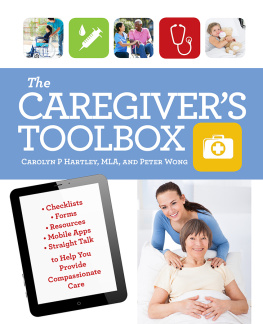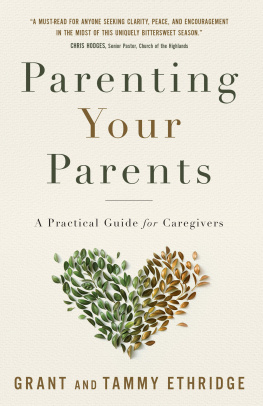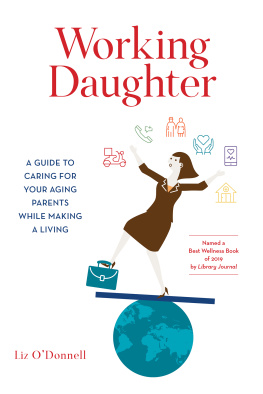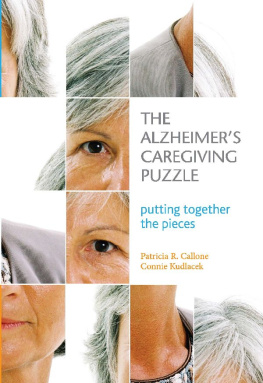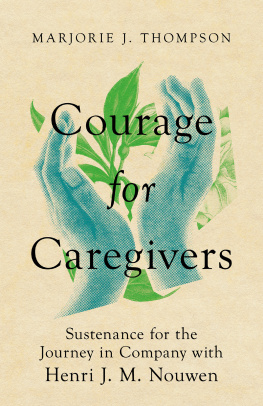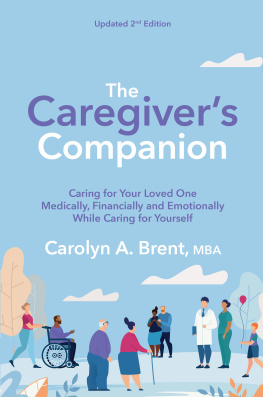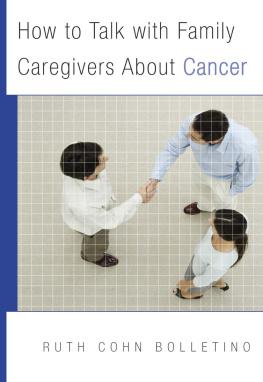The Caregivers Toolbox offers an invaluable mix of compassion and information. The authors deeply understand the challenges and trials of caregiving and have created a tools list that kindly helps ease stress and increase competency and organization. This book is an important companion for anyone guiding another through the health care system.
Deborah Shouse, author of Love in the Land of Dementia:
Finding Hope in the Caregivers Journey
Providing care for a loved one is, for many of us, anything but a simple task. In their superb treatise The Caregivers Toolbox , Carolyn Hartley and Peter Wong outline not only a modern, technology-driven approach to delivering this care, but more importantly, a humanistic one. Exploring how caregivers can leverage such electronic tools as PHRs, physician EHRs, mobile apps, and web portals, the book provides a cost-effective and highly actionable path forward. The authors also expertly walk the reader through many of the financial, legal, and ethical hurdles facing caregivers and do so in a format that is loving, practical, and exceedingly accessible. This is an invaluable resource for anyone who has stepped into the ever challenging yet highly important role of caregiver.
Robert Tennant, director, Health Information Technology Policy,
Medical Group Management Association
There is an old saying: Life is a cruel teacher; first you take the test, and then you learn the lesson. The Caregivers Toolbox helps simplify and accelerate the process of turning the average person into the extraordinary caregiver. By sharing actual experiences and providing checklists, proven solutions to common problems, and references to other resources, Carolyn and Peter have equipped caregivers to maintain life balance while absorbing the additional demands of providing care to our loved ones.
Ian K. Gordon, senior vice president, Regence Health Insurance Operations
My mom is ninety-one and my dad is eighty-nine. I am blessed to have parents that are active, self-sufficient, and in good health. Dad is still managing his rental property business and enjoys the work. Mom loves to be outside and work in her garden. I have thought about it many times but have yet to gather all the information related to my parents finances and business.
In The Caregivers Toolbox , Carolyn and Peter lay out a comprehensive road map on how to build a technology plan for your loved one. Their advice on how to start the discussion and how to locate and gain access to financial accounts gives me a starting point to begin the process. The checklists in chapter 4 provide the tools to get organized and make sure all important data is captured. I am finally ready to get started!
There will be a day when my parents are unable to take care of themselves. Acting now to build a technology plan for my parents will save countless hours and avoid some unpleasant surprises down the road. Thanks to Carolyn and Peter for helping me get started.
Bruce Honeycutt, chief internal audit and compliance vice president,
Blue Cross Blue Shield of South Carolina
The authors suggestion to create a Documentation Plan helped my mother and me prepare for her relocation from a multistory home to retirement patio home living. The Documentation Plan forced us to organize in a thoughtful and complete manner prior to packing up the household belongings. The templates provided in the book helped us purge unnecessary paper, create appropriate electronic backups for what was important, and identify knowledge gaps related to infrequently used account information. These practical, easy-to-use tools are a blessing.
Don Fowler, vice president, client relationships,
Highmark Blue Cross Blue Shield
As a doctor, I see patients and their families daily who struggle with the challenges of caregiving. Many seem ill equipped for the multifaceted decisions they will face. I have often said that everyone needs a health care advocate, someone within the system who can advise and guide him or her.
Caregivers often are called on to be the health care, financial, and legal advocates for their loved ones. This responsibility can be a daunting task for caregivers who are unprepared. This masterful book is an essential resource providing a plethora of websites, practical charts, and checklists easily organized so that caregivers are equipped to meet many circumstances.
During the publishing process, this book had personal application to me and my wife when my uncle and my father-in-law were each referred to hospice. We reread the later chapters, and the information gave us a better understanding and helped us prepare for their deaths. I hope and trust that you and your loved one will derive a great benefit from this remarkable work.
Randall K. Thomas, OD, MPH, FAAO
Having been an RN for several years as a director of home health care, having gone through many of these issues you mention with my own father and, now, with a friend who is paralyzed, I think that the content of your book would be so valuable to so many people!
Caregivers need so much support. Several points I found helpful included the recommendation to express feelings. I found the section on the treasure of walking with someone through the dying process very true in my own experience. I would not trade one single moment of staying with my dad that final month as he died. It is time well invested, and I am so thankful for it. I also appreciated your comments about guilt. I experienced guilt because my dad so wanted to go home, but when it was time for hospice and we had the home alternative, even with my nursing experience, I could not do it. I knew that we needed the support of hospice nurses. It turned out that he did have trouble with secretions, and I was glad he died at hospice. I could ask questions as his loved one, not as a nurse. I even called in the nurse and told her I needed her permission to fall asleep since I feared daddy would die while I was sleeping. She gave me that permission and assured me that many times people wait to die until their loved ones leave the room.
I also appreciated the section on finding out the wishes of the dying one in terms of plans. A doctor once asked me to serve as a hospice nurse because I love talking with those who are dying about what their wishes are for their memorial service and things like that. I distinctly recall one home health patient whom I gave at-home chemo, and he said his family would not talk to him about his dying, though he felt that he was dying. It was so common and so sad that while his family sat in a separate room watching TV, he shared with me his thoughts about dying. So the tools you are sharing about how to truly help each other as we go through the dying process is so crucial.
So many of your insights are right on the mark in terms of what caregivers really experience. I pray that the Lord uses your and your coauthors book to help many people. Thanks so much for sharing with me.
Tricia Scribner
Also by Carolyn P. Hartley
For Consumers
Working Womans Communications Survival Guide
How to Be a Master Lobbyist and Still Have Your Mother Love You
For Health Care Professionals
HIPAA Plain & Simple : 1st, 2nd, and 3rd edition
A Guide to Achieving Meaningful Use: Leverage Your EHR to Redesign Workflows and Improve Outcomes
EHR Implementation: A Step-by-Step Guide for the Medical Practice : 1st and 2nd edition
ADA Practical Guide to HIPAA Compliance
Policies and Procedures for the Connected Practice
Technical and Financial Guide to EHR Implementation
Handbook for HIPAA Security Implementation
Field Guide to HIPAA Implementation : 1st and 2nd edition
HIPAA Transactions: A Non-Technical Business Guide for Health Care
HIPAA Privacy for Employers
HIPAA on Demand
HIPAA Privacy for Long Term Care
Next page
